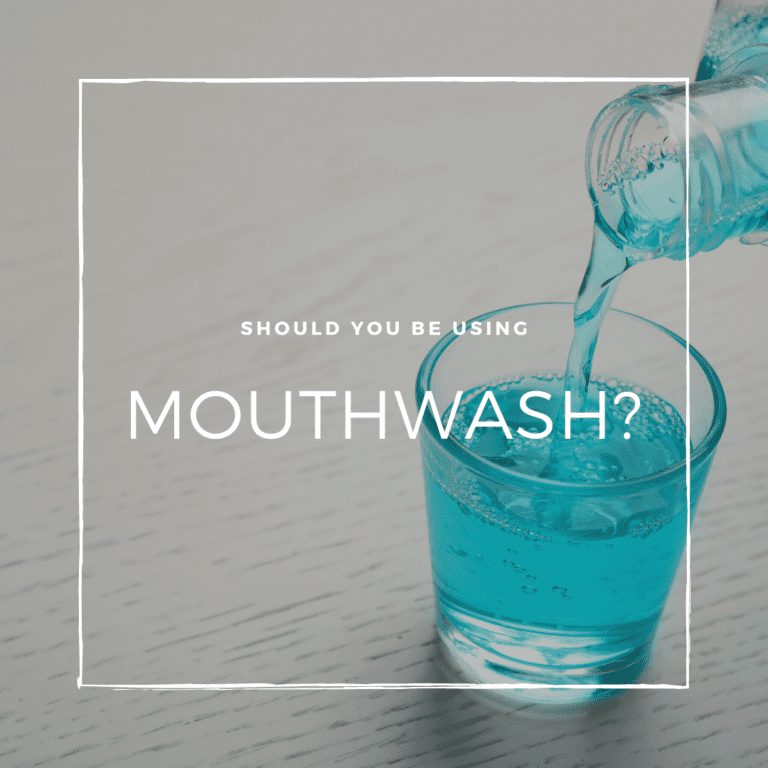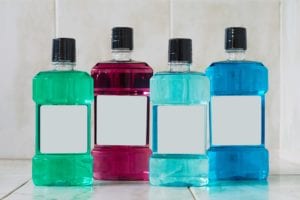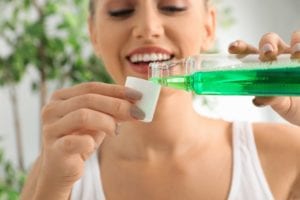Should You Be Using Mouthwash?

Did you know that the first mouthwash invented by Joseph Lister in the late 1800s was actually developed as a surgical antiseptic? Based on Louis Pasteur’s research on microbial infection, carbolic acid was used to reduce the rates of postoperative infections. Later in 1914, an alcohol-based formula was developed and sold in the US as the first over the counter mouthwash. As of 2020, approximately 60% of Americans were found to have used mouthwash over the course of the year.
Both people who use mouthwash and those who do not wonder whether they should be using mouthwash to maintain their oral health. After all, the American Dental Association mainly recommends brushing twice a day and flossing daily for good oral health, so is mouthwash really necessary? To answer this, we must first take a deeper look at what mouthwash is and how it works.
What is mouthwash?

Mouthwash, also known as oral rinse or mouth rinse, is a specialized liquid that is swished through the mouth and then spit out. This rinsing action helps to spread the ingredients of mouthwash throughout the mouth while also removing small pieces of debris from hard to reach places. There are two many classifications of mouthwash known as cosmetic and therapeutic. Cosmetic mouthwashes are mainly intended for masking odors associated with bad breath, while therapeutic mouthwashes actually contain specific ingredients that benefit your oral health. While cosmetic mouthwashes may be good to use if you’re in a pinch, they don’t offer the same benefits as therapeutic mouthwashes.
Therapeutic mouthwashes contain several beneficial ingredients, such as:
- Cetylpyridinium chloride: reduces bad breath
- Chlorhexidine: controls plaque and gingivitis (prescription only)
- Essential oils (eucalyptol, menthol, thymol, methyl salicylate): controls plaque and gingivitis
- Fluoride: strengthens tooth enamel to prevent decay
- Peroxide: used as a whitening agent in whitening mouthwashes
Should YOU be using mouthwash?

Now that we know more about the composition of mouthwash and how this can benefit your oral health, let’s take a look at when mouthwash use is appropriate and what type of mouthwash is best for you. Generally speaking, anyone can use mouthwash daily in addition to regular brushing and flossing to help prevent tooth decay and gum disease. However, mouthwash is not recommended for children under 6 since swallowing mouthwash can cause nausea, vomiting, or even intoxication. With that being said, here are some dental conditions that can benefit from using mouthwash:
- Dry Mouth: people with dry mouth produce less saliva than normal, which increases the risk of tooth decay and gum disease since saliva is responsible for cleaning the mouth. Using a mouthwash designed for dry mouth can help mimic the composition and feel of saliva. Mouthwashes for dry mouth generally contain ingredients such as fluoride, enzymes, cellulose derivatives, and/or animal mucins. Additionally, they should not contain alcohol since alcohol has been associated with causing dry mouth.
- Tooth Decay: using fluoride mouthwash has been associated with lower rates of tooth decay, especially in children. This is because fluoride strengthens the enamel and makes it more resistant to decay-causing bacteria.
- Plaque and Gingivitis: when plaque accumulates along the gum line, it can lead to an inflammation of the gums known as gingivitis. When gingivitis is not properly treated, it can progress into periodontitis. Mouthwash for gum disease should contain cetylpyridinium, chlorhexidine, and/or essential oils. Chlorhexidine mouthwashes are prescription only, while mouthwashes containing essential oils are found over the counter. Although chlorhexidine is highly effective for controlling plaque, prolonged use can cause staining.
- Stained Teeth: certain types of mouthwashes can be used to remove stains and whiten your smile. They also protect your teeth against the accumulation of new external stains. Whitening mouthwashes should contain either carbamide or hydrogen peroxide.






Recent Comments